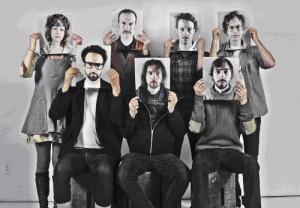
Question: Can a band call itself a “musical collective” and not sound pretentious?
Answer: Yes. If averages and estimation must be used to estimate the group’s size and/or the members can be divided into two or more groups based on frequency of appearance, then a band may rationally call itself a musical collective.
In order to explain how many members of Broken Social Scene there are, drummer Justin Peroff has to resort to terms like “core member” and “satellite member.” He further subdivides frequent satellites like Emily Haines, Jimmy Shaw and Feist into a category he calls “the usual suspects.” Peroff estimates that the touring membership averages six to nine and fluctuates to 16 for shows in Toronto, the band’s home base.
The fluctuating membership distinguishes Broken Social Scene as an exercise in flexibility. For one tour, the band left it up to promoters at the tour’s different stops to find local female vocals and horn players to join them onstage.
“We wouldn’t hear them until soundcheck,” says Peroff. “It went really well. In Singapore, apparently this gal who was a really popular pop singer–of course we had no idea who she was–steps onstage and the crowd went nuts.”
[youtube]http://www.youtube.com/watch?v=qfufvT_hHC4[/youtube]
Tonight, some version of Broken Social Scene plays at Tipitina’s. Their latest album, 2010’s Forgiveness Rock Record, is their strongest album since 2002’s You Forgot It In People and may be better. The tracks are tight enough to be chart-friendly while the soundscapes remind you that this is a band composed of master sound-crafters.
Forgiveness Rock Record’s critical success is due to two factors: a focused group of core members and the correct choice to work with a different producer. Broken Social Scene whittled down to a svelte six members: Brendan Canning, Kevin Drew, Justin Peroff on drums, Charles Spearin on keyboards, and Andrew Whiteman and Sam Goldberg on guitar and bass. They admired producer John McEntire’s post-rock work with bands like Tortoise and the Sea and Cake, which Peroff affectionately calls the “90’s thrill junkie scene,” and flew to Chicago to record at McEntire’s Soma Studios. Recording with a new producer was a big step for the band, who Peroff says is one that prefers to work closely with their production. Given Broken Social Scene’s love for large, melodic soundscapes, that’s understandable.
McEntire’s unique production style took Forgiveness Rock Record in an entirely different direction than the band’s previous work with David Newfeld. Nearly every song has vocals, which is unexpected given the producer and the band’s penchant for soundscapes. Without giving too much away, Peroff hints that McEntire did “this really cool thing with steel drums” that blew the band’s minds. “I don’t want to give away his techniques, but I’m just going to say it was really amazing, and I would have never thought to have done something like this. He surprised us.”
At tonight’s show, Broken Social Scene will play a balanced set between old favorites and new tracks from Forgiveness Rock Record. The show starts at 9 p.m. and doors open at 8. Tickets are $21 (no longer available on Ticketweb, so call the box office). Zeus opens.




